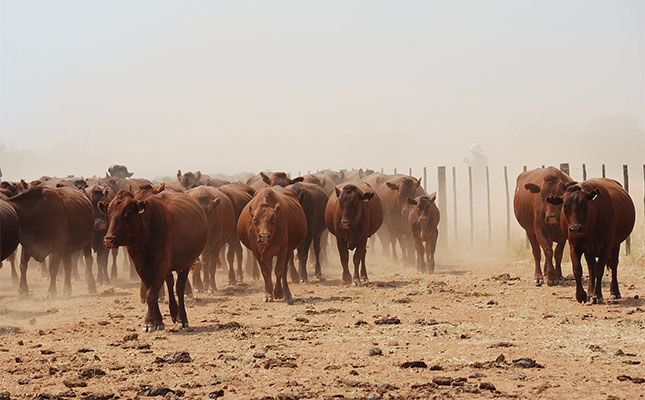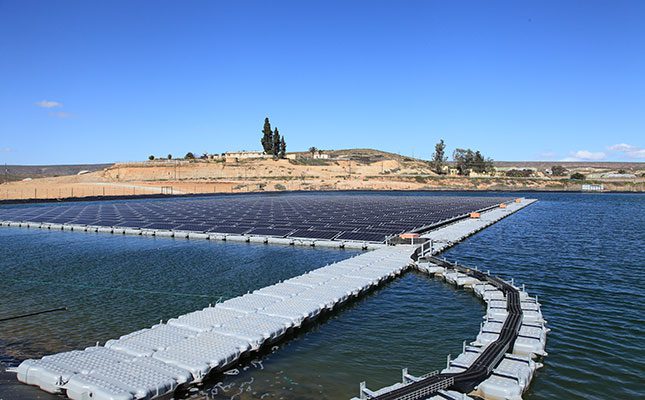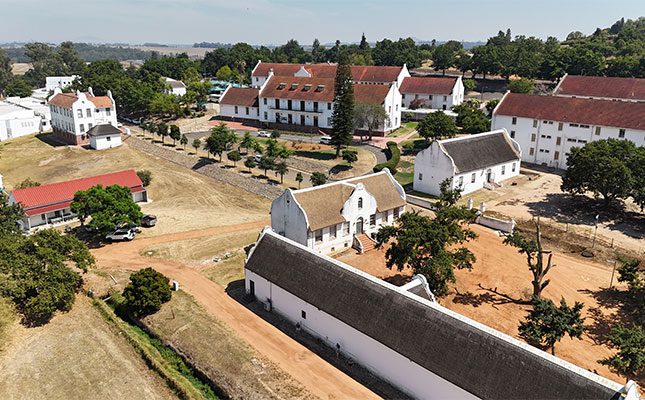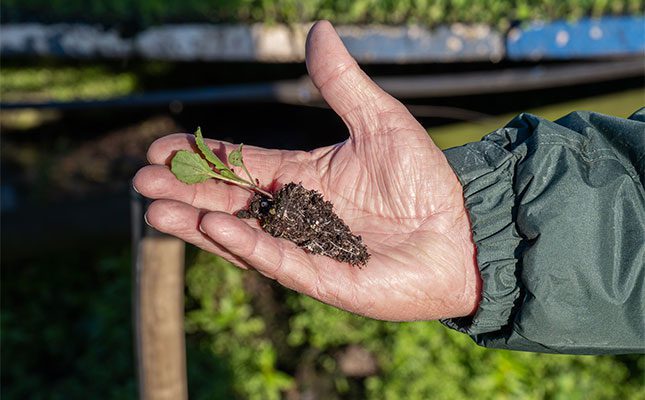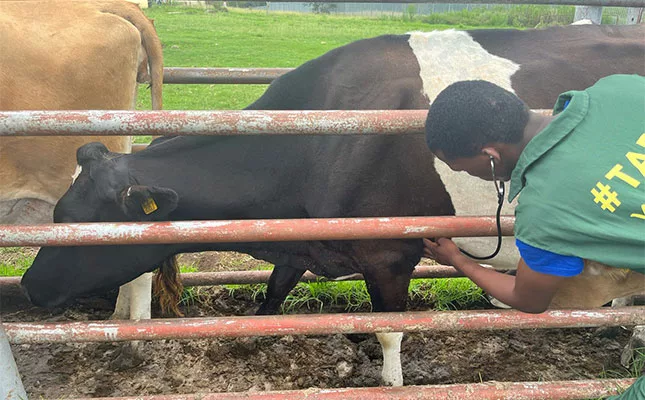
Tsolo College of Agriculture was founded in 1904 in the former Transkei, but training stopped after 1994, following the establishment of the democratic government.
Then in 2015, the college was re-engineered, renamed Tsolo Agriculture and Rural Development Institute (TARDI), and launched a diploma in animal health under Principal Dr Nandipha Ndudane, who is also president of the South African Veterinary Council.
TARDI provides agricultural training, technical support, and research to address herd health, rural poverty, food insecurity, and skills development.
“My aspirations for TARDI include the implementation of a functional structure that reflects our re-engineered teaching and learning mandate. Currently, we operate under a structure designed for a ‘farmer development centre’, which limits our potential.
“Proper funding is critical to expand our impact on communities, youth, and farmers,” says Ndudane.

Animal health diploma
TARDI offers a three-year Diploma in Animal Health (NQF level 6) that is fully recognised by the South African Veterinary Council (SAVC). Graduates are immediately registered as animal health technicians under the ‘para-veterinary’ category.
All academic personnel are registered with their respective accreditation bodies, such as SAVC and the South African Council for Natural Scientific Professions. Most of the lecturing staff hold postgraduate qualifications, and some are competent to act as assessors, moderators, or facilitators.
First-year subjects include veterinary anatomy and physiology; computer literacy; occupational communication; animal handling and welfare; aquaculture and wildlife; non-ruminant animal production; and veterinary pathology, microbiology, and immunology, and veterinary parasitology.
In the second year, subjects like pasture science and nutrition, agricultural production economics, veterinary public health and hygiene, preventive veterinary medicine, veterinary epidemiology, and veterinary obstetrics and gynaecology are added.
Third-year subjects include meat inspection, research methods, rural development, project management, artificial insemination, and tuberculosis and contagious abortion.
Practical training prepares students to meet the SAVC animal health technician Day One Competencies. These include disease surveillance and inspection of all livestock, biosecurity assessment, providing extension services, and performing animal husbandry services such as dehorning, tail docking, and castration.
Students also learn to implement parasite control and vaccination programmes and conduct basic post-mortem examinations. They engage in weekly farm skills training, animal healthcare days, field excursions, and six-month work-integrated learning (WIL) placements in their final year.
“Through field excursions, our students gain practical exposure to the animal health and agriculture industry,” adds Ndudane.
This practical exposure includes veterinary laboratory diagnostics, sampling and microbiology, and meat inspection.
Ndudane says there are plans to expand TARDI’s curriculum. “After a curriculum review by the [Food and Agriculture Organization of the United Nations (FAO)] in 2024, we might expand on animal welfare and ethics, including biosecurity, One Health, entrepreneurship, as well as the Internet of Things and innovation,” she explains.
Research at TARDI is still in its early stages, but previous collaborations have included GalvMed (on cysticercosis, an infection caused by tapeworm), Walter Sisulu University (on aquaculture), and the Agricultural Research Institute (sweet potato crop research).
Students and facilities
To support students in their studies, TARDI has a community animal clinic, livestock (including kraals, ramps, a dairy, and a rabbit facility), two computer labs, lecture halls, a 300-pax multipurpose hall, and a well-stocked library. Staff include SAVC-registered veterinarians and animal health technicians, animal scientists, and extension officers.
The livestock component consists of 60 beef cattle, 15 dairy cows, and 60 sheep, while the student body comprises 185 students (split roughly evenly between male and female), with 90 having started their studies this year.
TARDI has gender-specific dorms and additional accommodation for visiting lecturers, interns, and farmers.
The college’s land, around 2km from the town of Tsolo, covers 900ha. Seasonal vegetables are planted, but the maize fields are left uncultivated due to the theft of the boundary fence. The campus includes rugby and soccer fields, which are also used by the Tsolo community, but the netball and volleyball fields need upgrading. Wi-Fi, funded by the FAO, is currently being installed.
Abattoirs and radio stations
The institute works with a range of organisations to secure placements for graduates. These include pharmaceutical companies, the South African Veterinary Association’s community veterinary clinics (SAVA-CVC), agricultural colleges, African Advanced Academy, Ntinga OR Tambo Development (beef farm and abattoir), welfare organisations, veterinarians, and commercial livestock farms.
TARDI participates in the national Compulsory Community Service for veterinarians and the Primary Animal Health Care programmes. Veterinarians placed here lecture, participate in community outreach programmes, and spay and awareness campaigns.
The institute also gives back to the community. Through collaboration with SAVA-CVC, TARDI alumni and students participate in outreach programmes such as the successful rabies control effort in Gqeberha.
In addition, some alumni have slots on local radio stations, including Umhlobo Wenene FM, talking about disease control and prevention strategies.
TARDI uses a mobile and an in-house veterinary clinic for training and consultations with the public, giving the students exposure to real-life scenarios. They perform basic tests such as pen-side tests for PPR (a highly contagious viral disease), blood and brain smears, and worm detection.
The institute has a modern, well-equipped home industry department that employs a consumer scientist, fashion designer, and food technologist, among others. Short courses are open to the public and include sewing, catering, baking, and agro-processing, such as yoghurt and jam production.
Food safety forms part of the microbiology module for first-year students, while agro-processing is available to Enactus students.
TARDI’s diverse agricultural infrastructure enables it to offer credit-bearing learnerships in partnership with AgriSETA, as well as non-credit training, such as tractor maintenance workshops. One of the institute’s two computer labs is used by the community and high school learners for computer literacy training.
Student life
Beyond its sound academic programme, TARDI supports the holistic development of students. Its soccer, rugby, volleyball, netball, and choral teams actively participate in annual agricultural college competitions, while the chess team represents the institute at national tournaments.
TARDI is the only agricultural college to have joined the Enactus programme.
“This enables our students to start thinking about business design while at the college. This allows them to grow in confidence, skills, and purpose,” explains Ndudane.
Challenges abound
“Mental health is a concern. While we lack an in-house psychologist, we’ve partnered with NGOs for monthly awareness campaigns and weekly student support,” adds Ndudane.Vandalism and student safety in town are also ongoing challenges.
“We would like to recruit an information and communication technology specialist to support lecturing and students. We also need perimeter fencing and personal protective equipment for lecturing staff,” she concludes.
Click here to apply to study animal health at TARDI in 2026. Applications close on 30 November 2025.
For enquiries, internships, WIL, and sponsorships, phone Dr Nandipha Ndudane on 072 430 0970, or email her at [email protected]. Alternatively, phone TARDI’s office line on 047 542 0221.
Get trusted farming news from Farmers Weekly in Google Top Stories.
➕ Add Farmers Weekly to Google ✔ Takes 10 seconds · ✔ Remove anytime
